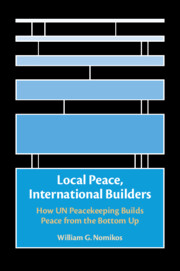Refine search
Actions for selected content:
47 results
11 - The Negative Impact of Sanctions on Humanitarian Aid
- from Part I - Humanitarian Consequences
-
-
- Book:
- Economic Sanctions from Havana to Baghdad
- Published online:
- 28 November 2025
- Print publication:
- 18 December 2025, pp 212-237
-
- Chapter
-
- You have access
- Open access
- HTML
- Export citation
A house divided: Feminist and conservative NGOs’ legitimacy beliefs about the United Nations
-
- Journal:
- Review of International Studies , First View
- Published online by Cambridge University Press:
- 04 November 2025, pp. 1-25
-
- Article
-
- You have access
- Open access
- HTML
- Export citation
4 - Governance Shapers?
-
-
- Book:
- International Organizations Engaging the World
- Published online:
- 09 October 2025
- Print publication:
- 23 October 2025, pp 61-83
-
- Chapter
-
- You have access
- Open access
- HTML
- Export citation
Chapter 12 - Mandates
-
- Book:
- The Peacemaking Mandate
- Published online:
- 12 September 2025
- Print publication:
- 02 October 2025, pp 285-306
-
- Chapter
- Export citation
Chapter 7 - Mandates in Multiparty Mediation
-
- Book:
- The Peacemaking Mandate
- Published online:
- 12 September 2025
- Print publication:
- 02 October 2025, pp 153-182
-
- Chapter
- Export citation
5 - The New Regime and the Digital Economy, 2016–2023
-
- Book:
- The International Tax Revolution
- Published online:
- 28 June 2025
- Print publication:
- 03 July 2025, pp 131-186
-
- Chapter
- Export citation
Chapter 7 - Women in the military in Australia and Canada
- from Part 3 - Women and force expansion
-
-
- Book:
- Mobilising the Australian Army
- Published online:
- 23 May 2025
- Print publication:
- 30 May 2025, pp 143-168
-
- Chapter
- Export citation
3 - ‘The Outbreak of Peace’
-
- Book:
- The Nehru Years
- Published online:
- 29 April 2025
- Print publication:
- 10 April 2025, pp 32-72
-
- Chapter
- Export citation
5 - ‘Bad Ethics and Worse Policy’
-
- Book:
- The Nehru Years
- Published online:
- 29 April 2025
- Print publication:
- 10 April 2025, pp 133-176
-
- Chapter
- Export citation
4 - ‘The Fog of War’
-
- Book:
- The Nehru Years
- Published online:
- 29 April 2025
- Print publication:
- 10 April 2025, pp 73-132
-
- Chapter
- Export citation
Assessing the Efficacy of the Responsibility to Protect (R2P) Principle amidst the Misuse of Veto Power: A Critical Analysis
-
- Journal:
- International Journal of Legal Information / Volume 53 / Issue 1 / Spring 2025
- Published online by Cambridge University Press:
- 19 June 2025, pp. 64-71
- Print publication:
- Spring 2025
-
- Article
- Export citation
9 - Conclusion
- from Part III - Implications for Academics and Policymakers
-
- Book:
- Local Peace, International Builders
- Published online:
- 02 January 2025
- Print publication:
- 16 January 2025, pp 177-186
-
- Chapter
-
- You have access
- Open access
- Export citation
1 - Introduction
- from Part I - Localized Peace Enforcement Theory
-
- Book:
- Local Peace, International Builders
- Published online:
- 02 January 2025
- Print publication:
- 16 January 2025, pp 3-21
-
- Chapter
-
- You have access
- Open access
- Export citation
Norm expressivism and punishment in International Relations
-
- Journal:
- Review of International Studies , First View
- Published online by Cambridge University Press:
- 13 January 2025, pp. 1-21
-
- Article
-
- You have access
- Open access
- HTML
- Export citation

Local Peace, International Builders
- How UN Peacekeeping Builds Peace from the Bottom Up
-
- Published online:
- 02 January 2025
- Print publication:
- 16 January 2025
-
- Book
-
- You have access
- Open access
- Export citation
13 - Regulatory Contestation and the Creation of Transnational Legal Orders
- from Part IV - Dimensions of Norm Contestation
-
-
- Book:
- Contesting the World
- Published online:
- 01 November 2024
- Print publication:
- 06 June 2024, pp 219-235
-
- Chapter
- Export citation
3 - Understanding and Resolving Norm Conflict
- from Part I - Norm Strength, Collisions, and Conflicts
-
-
- Book:
- Contesting the World
- Published online:
- 01 November 2024
- Print publication:
- 06 June 2024, pp 43-63
-
- Chapter
- Export citation
3 - The Quiet Negotiator
-
- Book:
- UN Mediators in Syria
- Published online:
- 16 May 2024
- Print publication:
- 23 May 2024, pp 91-150
-
- Chapter
- Export citation
5 - Conclusion
-
- Book:
- UN Mediators in Syria
- Published online:
- 16 May 2024
- Print publication:
- 23 May 2024, pp 233-264
-
- Chapter
- Export citation
4 - The Televised Humanitarian
-
- Book:
- UN Mediators in Syria
- Published online:
- 16 May 2024
- Print publication:
- 23 May 2024, pp 151-232
-
- Chapter
- Export citation
